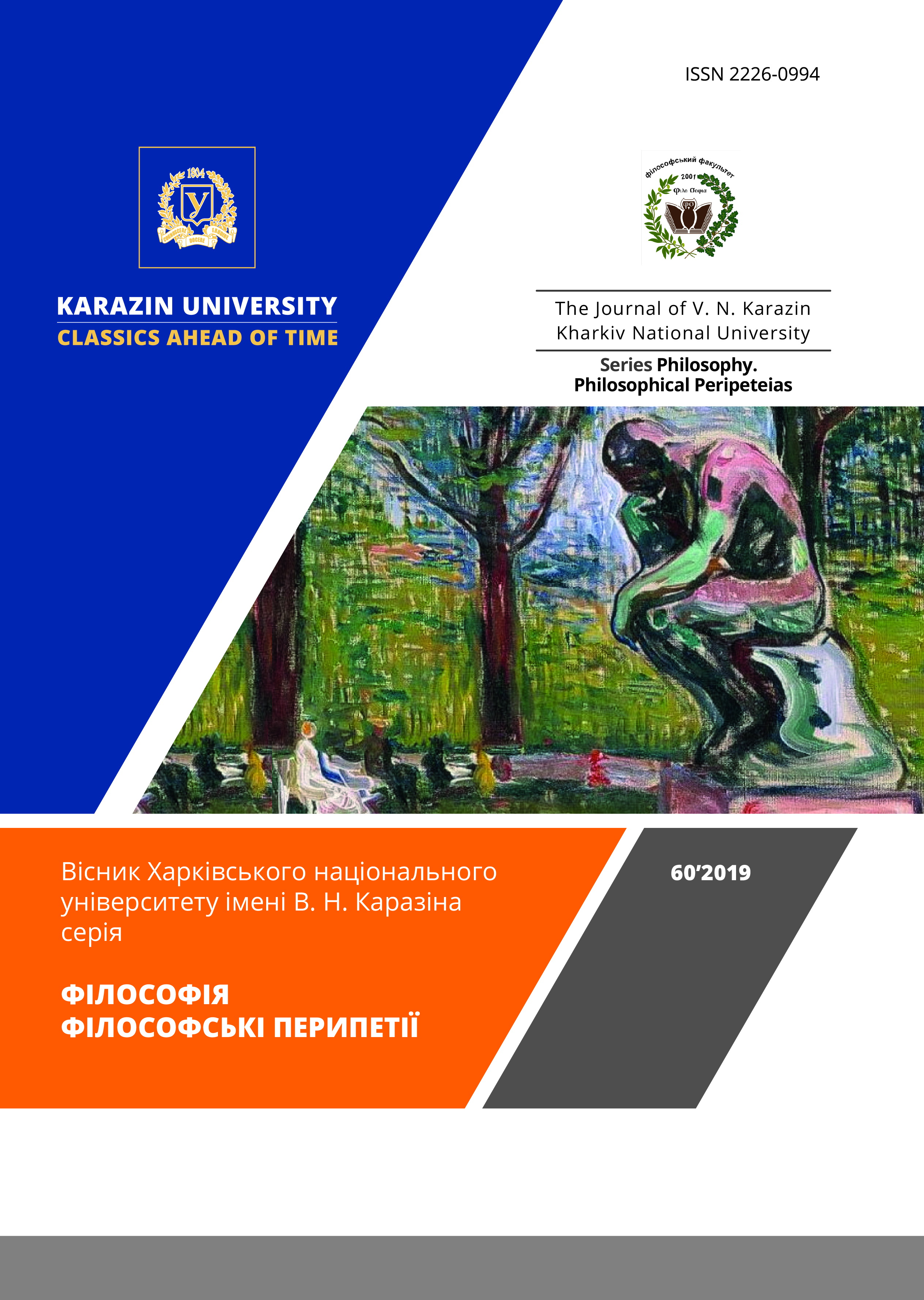PHENOMENON OF MEMORY IN RETROSPECTIVE OF ANTIQUITY
Abstract
The article deals with the formation of understanding and interpretation of the phenomenon of memory in the European philosophical tradition. The historical-cultural and linguistic-semantic connections of the ideological paradigm of Ancient Greek thinkers and philosophers are researched. In article revealded a peculiarities of the main philosophical categories of Plato’s philosophy in the context of explaining the phenomenon of memory and memories. We realized a distinction for better understanding of the phenomenon of memory for ancient culture into two branches: 1) memory as a natural property of man and 2) memory as a technique, as a skill for perfection, as an instrument. We emphasize that ancient categories: eidos, logos and cosmos are the central of the theory of memory of the western tradition, which we can also observe in the treatises left by Plato. Also we analyzed the connection between the Platonian theory of memory and the development of knowledge about memory paradigm. Memory for Plato is determined by a metaphysical character, like immortal knowledge, it is a way of human transcendence. An intelligent soul for Plato is the translator of eternal knowledge of things through which we learn not only the world, but also receive knowledge (remember) about ourselves, our true perceptual perception, and represent our ideas in real forms. The soul of man for Plato, due to memory, connects human existence from outside the physical space and time, where there is simultaneously the past, present and future, which at the metaphysical level are united into a concrete conceptual design of memory. Thus, the Platonic theory of memory as a reproduction of knowledge can not relate to the development of the art of memory, but has a direct connection with the development of the paradigm of knowledge about memory and allows us to understand the concept of memory as a philosophical and cultural phenomenon. We noted that the theory of Plato’s memory resembles the same categories as the art of memory, it is a category of “place” bearing memory-reflection in the memory of the soul and “image” of true knowledge.
Downloads
References
/References
Arisophanes. (1996). Lysistrata (Vol. 3). (B. B. Rogers, Trans.). Cambridge, MA: Harvard University Press. (Loeb Classical Library).
Bernecker, S., & Mickaelian, K. (Eds.). (2017). Routledge Handbook of Philosophy of Memory. Oxon, New York: Routledge.
Bolak, J. (2009). Memory/oblivion. In B. Cassin (Ed.), European Dictionary of Philosophy: Lexicon of Untranslatables (pp. 351–362). Kyiv: Dukh i Litera. (In Ukrainian).
Burnyeat, M. (1990). The Theaetetus of Plato. (M. J. Levett, Trans.). Cambridge, MA: Hackett Publishing Company.
Chanyshev, A. N. (1981). The Course of Lectures on Ancient Philosophy. Moscow: Vysshaia shkola. (In Russian).
Franko, I. Yak. (1977). Theogony. In I. Yak. Franko, Collected Works in 50 volumes: Poetic translations and rehashes (Vol. 8, pp. 294–298). (A. O. Biletskyi, Ed.). Kyiv: Naukova dumka. (In Ukrainian).
Gosling, J. C. (1975). Plato: Philebus. Oxford: Calderon Press.
Hackforth, R. (1997). Plato’s Phaedrus. Cambridge: Cambridge University Press. (Original work published 1952).
Kahn, C. H. (1979). The Art and Thought of Heraclitus. Cambridge: Cambridge University Press.
Kun, M. A. (2008). Legends and Myths of Ancient Greece. Kharkiv: Folio. (Original work published 1922). (In Ukrainian).
Losev, A. F. (1989). The Daring of the Spirit. Moscow: Politidzdat. (In Russian).
Shynkaruk, V. I. (2002). Philosophical Encyclopedic Dictionary. Kyiv: Abris. (In Ukrainian).
Russell, B. A. (1945). History of Western Philosophy. New York: Simon & Schuster.
Small, J. P. (1997). Wax Tablets of the Mind Cognitive Studies of Memory and Literacy in Classical Antiquity. Routledge: London, New York.
Yets, F. A. (1966). The Art of Memory. Chicago: University of Chicago Press.
Болак Ж. Пам’ять/забуття. Європейський словник філософій: Лексикон неперекладностей / пер. з франц.; за ред. Б. Кассен. К.: Дух і Літера, 2009. С. 351–362.
Кун М. А. Легенди і міфи Стародавньої Греції. Х.: Фоліо, 2008. 447 с.
Лосев А. Ф. Дерзание духа. М.: Политиздат, 1989. 366 с.
Філософський енциклопедичний словник / за ред. В. І. Шинкарука та ін. К.: Абрис, 2002. 746 с.
Франко І. Я. Теогонія. Франко І. Я. Зібрання творів: у 50-ти т.; т. 8. Поетичні переклади та переспіви / за ред. А. О. Білецького. К.: Наукова думка, 1977. С. 294–298.
Чанышев А. Н. Курс лекций по древней философии: Учеб. пособие для филос. фак. и отделений ун-тов. М.: Высшая школа, 1981. 374 с.
Burnyeat M. The Theaetetus of Plato. Cambridge, MA: Hackett Publishing Company, 1990. 352 p.
Gosling J. C. B. Plato Philebus. Oxford: Calderon Press, 1975. 238 p.
Hackforth R. Plato’s Phaedrus. Cambridge: Cambridge University Press, 1997. 172 p.
Kahn C. H. The Art and Thought of Heraclitus. Cambridge: Cambridge University Press, 1979. 354 p.
Aristophanes. Lysistrata / Trans. by B. B. Rogers. Cambridge, MA: Harvard University Press. 1996. Vol. 3. 247 p. (Loeb Classical Library).
Bernecker S., Mickaelian K. (Eds.). Routledge Handbook of Philosophy of Memory. Oxon, New York: Routledge, 2017. 590 p.
Russell B. A History of Western Philosophy. New York: Simon & Schuster, 1945. 832 p.
Small J. P. Wax Tablets of the Mind: Cognitive Studies of Memory and Literacy in Classical Antiquity. Routledge: London, New York, 1997. 396 p.
Yets F. A. The Art of Memory. Chicago: University of Chicago Press, 1966. 400 p.
Authors who publish with this journal agree to the following terms:
- Authors retain copyright and grant the journal right of first publication of this work under the terms of a license Creative Commons Attribution License 4.0 International (CC BY 4.0).
- Authors are able to enter into separate, additional contractual arrangements for the non-exclusive distribution of the journal's published version of the work (e.g., post it to an institutional repository or publish it in a book), with an acknowledgement of its initial publication in this journal.
- Authors are permitted and encouraged to post their work online (e.g., in institutional repositories or on their website) prior to and during the submission process, as it can lead to productive exchanges, as well as earlier and greater citation of published work.






3.gif)




